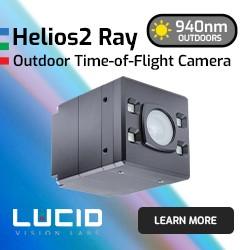Velodyne Executive Addresses How Velodyne's Next Generation of Sensors Will Enable True Autonomy
Anand Gopalan, Velodyne LiDAR CTO, Discusses the Path for LiDAR in Powering Autonomous Vehicle Success at Sensors Expo & Conference
-Anand Gopalan, Ph.D., Chief Technology Officer (CTO) at Velodyne LiDAR, Inc., will deliver a featured presentation on LiDAR technology at the upcoming Sensors Expo & Conference in San Jose, Calif. on June 28. Gopalan will review the critical success factors LiDAR technology must achieve for autonomous driving and advanced vehicle safety at highway speeds.
"High Definition 3D LiDAR: The Key Sensing and Perception System for Self-Driving Cars"
Tweet this
Sensor Expo attendees will hear Gopalan, a distinguished engineer and recognized LiDAR authority, discuss the evolution of LiDAR. He will share insights on how LiDAR provides the accurate distance and reflectivity measurements at highway speeds needed to enable advanced level 4 and level 5 autonomous vehicles. To show how these capabilities can be deployed today, Gopalan will introduce the audience to Velodynes most recent offering, the VLS-128™, which is the world's most advanced LiDAR sensor. A culmination of ten years of LiDAR development and learning from millions of road miles, the VLS-128 provides the range, resolution and accuracy required by the most advanced autonomous vehicle programs in the world.
"In this formative stage when the industry is still focused on proving the safety case for autonomous vehicles, automakers need to focus on a sensor that provides the maximum amount of data with the least number of false positives. In other words, a point cloud with minimal erroneous points should be paramount," said Gopalan.
While presenting the robust sensing data of the VLS-128, Gopalan will delve deeper into performance metrics, including range, accuracy, resolution and more, that are imperative to making an autonomous vehicle operate successfully. He will also examine reliability and scalability metrics needed to ensure the automotive-grade readiness and high-volume production of LiDAR sensors required by automakers and fleet operators.
In his session, Gopalan will discuss the imperative for LiDAR manufacturers to move beyond a lab demonstration or proof of concept and "demonstrate the ability to produce the sensor in large volumes." He will examine how "this not only requires a fundamentally scalable architecture but the use of components that have a clear path to being manufactured in quantities of millions. Mass production must be coupled with a demonstrated ability to address the challenges of manufacturing a complex technology to automotive standards."
Gopalans session, called "High Definition 3D LiDAR: The Key Sensing and Perception System for Self-Driving Cars," takes place on Thursday, June 28, from 1:30 p.m. to 2:20 p.m. in Executive Ballroom B at the McEnery Convention Center in San Jose, Calif. The Sensors Expo & Conference is North America's premier event focused exclusively on sensors and sensor-integrated systems and runs June 26-28, 2018.
At Velodyne LiDAR, Gopalan is responsible for the advanced product development and technology development that are powering the company's next generation LiDAR products. He is a seasoned technology executive with experience building and leading worldwide engineering organizations for the development of products in consumer, networking and enterprise domains.
About Velodyne LiDAR
Founded in 1983 and headquartered in Silicon Valley, Velodyne is a technology company known worldwide for its real-time 3D LiDAR computing and software platforms. The company evolved after founder David Hall invented the HDL-64 Solid-State Hybrid LiDAR sensor in 2005. Since then, Velodyne LiDAR, Inc. emerged as the unmatched market leader of real-time 3D vision systems used in a variety of commercial applications including autonomous vehicles, vehicle safety systems, mobile mapping, aerial mapping, and security. Its products range from the high-performance, surround view Ultra-Puck™ VLP-32, classic HDL-32/64 and cost-effective VLP-16, the new VLS-128, to the upcoming, hidden Velarray™. Velodynes rich suite of perception software and algorithms are the key enablers of its perception systems. Velodyne supports customers from offices in San Jose, Detroit, Frankfurt, and Beijing. For more information, visit http://www.velodynelidar.com.
Featured Product

Helios™2 Ray Time-of-Flight Camera Designed for Unmatched Performance in Outdoor Lighting Conditions
The Helios2 Ray camera is powered by Sony's DepthSense IMX556PLR ToF image sensor and is specifically engineered for exceptional performance in challenging outdoor lighting environments. Equipped with 940nm VCSEL laser diodes, the Helios2 Ray generates real-time 3D point clouds, even in direct sunlight, making it suitable for a wide range of outdoor applications. The Helios2 Ray offers the same IP67 and Factory Tough™ design as the standard Helios2 camera featuring a 640 x 480 depth resolution at distances of up to 8.3 meters and a frame rate of 30 fps.
